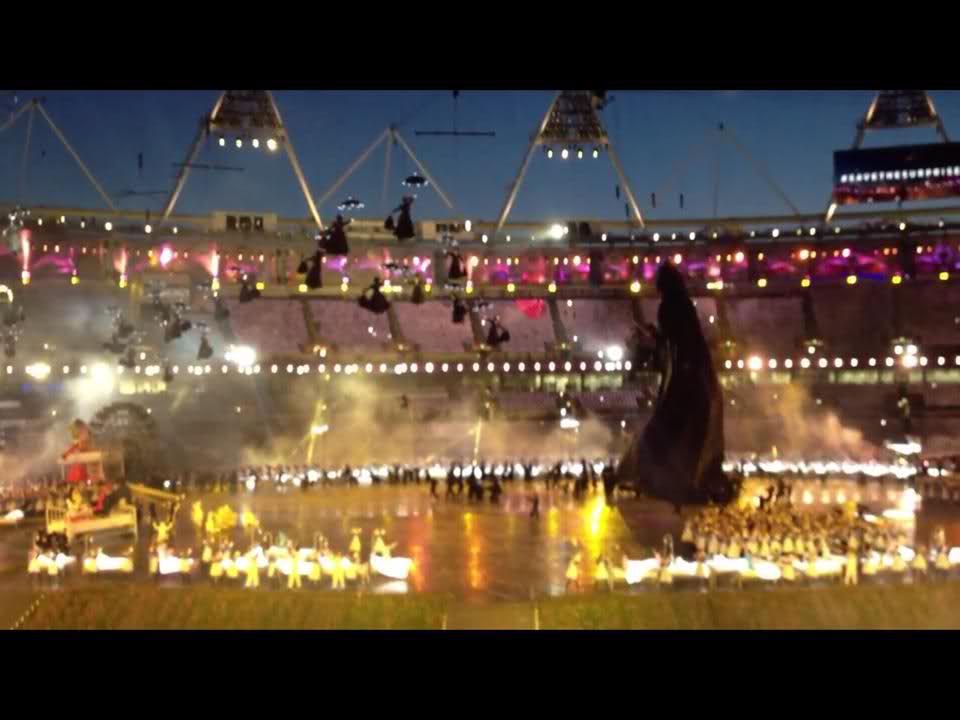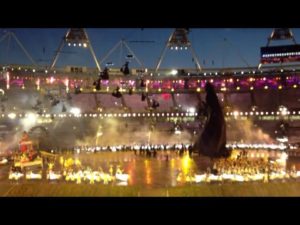Citius, Altius, Fortius
 It’s an even-numbered year, so it must be time for the youth of the world to gather in a major global metropolis to compete in the Olympic Games. This is a good thing, especially if you enjoy stories, because the Olympics are all about the stories. The World Championships of the various sports are of more practical significance in establishing the prowess of their most elite athletes, but the modern Olympics have from the very beginning been wrapped in a symbolism both individual and collective that transcends the rather prosaic act of bringing a bunch of people from dozens of different nations together in one place to play games.
It’s an even-numbered year, so it must be time for the youth of the world to gather in a major global metropolis to compete in the Olympic Games. This is a good thing, especially if you enjoy stories, because the Olympics are all about the stories. The World Championships of the various sports are of more practical significance in establishing the prowess of their most elite athletes, but the modern Olympics have from the very beginning been wrapped in a symbolism both individual and collective that transcends the rather prosaic act of bringing a bunch of people from dozens of different nations together in one place to play games.
People have lots of opinions about the Olympics, most gilded in moral, social, political, or religious imperatives that can be reduced to personal itches. Christians have been known to decry the perpetuation of a pagan festival idolizing physical perfection, while others view the Games as a global stage for Christian athletes to share their faith and display what used to be called a “muscular Christianity.” Many Londoners find the Olympics mostly a titanic inconvenience, which is perhaps the most honest, un-gilded reaction you’ll find anywhere, and not an unreasonable one.
One commentator believes we should be focusing more on the upcoming Mars landing and the Olympic-class feats of brainpower and mental agility that have made it possible, though paunchy, balding, middle-aged engineers in horn-rimmed glasses are a harder sell than ripped twenty-something athletes. Or maybe not.
Getting back to the stories, the opening ceremonies have evolved in recent years into a theatrical presentation of the host nation’s history and cultural distinctives. I enjoyed Danny Boyle’s whimsical little fairy tale of the evolution of England from bucolic agrarian paradise to gritty industrial powerhouse to enlightened social welfare state. Some folks noticed the production bore more than a passing resemblance to a certain epic trilogy of our acquaintance (thanks to Stephen for the link).
I won’t spend time here bloviating on the merits or demerits of the whole Olympic spectacle, other to say that I think most people get out of it what they bring to it. I like the Olympics, and will be spending a lot of time cheering for Team USA. I particularly enjoy the travelogue, a chance to watch some sports that get scant coverage at any other time, and the inspiring tales of individual athletes who have displayed remarkable courage in their journey to the Olympics and achieved victory in the face of impossible odds. That’s always a story worth telling.
The Olympics certainly aren’t an unalloyed showcase of high ideals and sportsmanship. I was a little disturbed today to read a news article featuring some comments by an American swimming coach skeptical of a gold-medal-winning performance by a young Chinese swimmer, who he suspects of blood doping. It wasn’t so much the allegation that bothered me–the Chinese team has been caught dabbling in performance-enhancing drugs on more than one occasion–but the knee-jerk assumption that because this young lady did so well, she must be cheating. This is the line that caught my eye:
Leonard rejected comparisons to Michael Phelps, who broke the 200m butterfly world record when he was just 15, back in 2001 because the American got “consistently faster every year on a normal improvement curve”.
I understand the man’s suspicion, but the underlying message is that it’s okay to improve as long as you stay on the curve and don’t improve faster than anybody else. To finish with a speculative element here, I’ll refer you to the story that immediately came to mind, Kurt Vonnegut’s scathing satire on enforced “equality,” Harrison Bergeron:
The year was 2081, and everybody was finally equal. They weren’t only equal before God and the law. They were equal every which way. Nobody was smarter than anybody else. Nobody was better looking than anybody else. Nobody was stronger or quicker than anybody else.
So much for “Citius, Altius, Fortius.” Read the whole thing.










































I love watching the Olympics, pageantry and all, because I know I could never do those things. It’s a chance to celebrate the achievements of others and support your country. (Slightly offtopic: Who here noticed the TARDIS noise during the digital age number?)
Besides, I was in London back in March, so I keep going “BEEN THERE” during some of the scenes.
Everybody keeps mentioning the TARDIS sound effect! I wasn’t able to catch the opening ceremony live (forgot it was on, actually) and I haven’t found many clips. Alas for NBC’s sucky monopoly on showing the Olympics.
I like the Olympics in small doses. Online I can even follow the cable-only sports like archery. This is the first year I’ve seen those. The rest of my life growing up, I thought the Olympics consisted of gymnastics and swimming. :-p
Kessie, let me give you a link to the video. Hope you enjoy it.
I’m a fan of the Olympics, though my preferred sports aren’t in the ones usually shown, like the whitewater sports, and the fencing. Those are the two big ones I like.
And if he did suspect her of cheating, accusations should be made in private. To tell the world is slander.
Btw, just want to point out that England and Britain are not synonyms…
Have just watched the opening ceremony. A bit confusing, I felt! Pleased to see the NHS being lauded. Fascinating to see Abide with Me being sung. Not sure if it’s appropriate for a Christian hymn to be used when most people, after all, are not Christians (according to the BBC commentator, it is sung at every Cup Final, which is just as odd). However, if people listened to the words and took them on board that can only be a good thing.
Kristy, I was amazed to hear the hymn, too. My one thought was that England, at least, isn’t ashamed of their Christian roots, unlike the US, it would seem.
About the Chinese swimmer. Her split time was faster than the fastest men’s swimmer. I don’t think it’s untoward to be suspicious! I heard no one saying anything other than that it was suspicious. In fact I heard repeated that there was no proof of cheating. But let’s face it, if a woman outran the men’s 100 meter winner, would we not be suspicious?
Becky
That’s strange – I would have thought of the US as being much more religious than the UK.